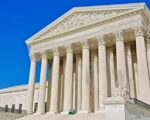>> Supreme Court allows same-sex marriages to proceed in Kansas, lifting stay
La Cour suprême a autorisé ce mercredi les couples homosexuels à se marier au Kansas, le 33e Etat américain sur 50 où le mariage gay est désormais légal, ainsi que dans la capitale fédérale Washington.
Dans une brève décision très attendue, sept des neuf juges suprêmes ont refusé la demande du Kansas de bloquer les mariages homosexuels dans cet Etat. Cette décision prend effet immédiatement.
La haute Cour confirme ainsi la décision d’un juge fédéral d’invalider l’interdiction de ces mariages dans la loi du Kansas. Seuls deux juges ultra-conservateurs Antonin Scalia et Clarence Thomas étaient contre, selon le document de la haute Cour.
Le mois dernier, le gouvernement Obama avait annoncé que le mariage entre personnes de même sexe était désormais reconnu dans 32 Etats sur 50, plus la capitale fédérale Washington.
Si le Kansas a encore un recours devant une cour d’appel, il est très peu probable qu’il soit entendu car cette cour a déjà retoqué les requêtes identiques de deux autres Etats, l’Oklahoma et l’Utah.
Le 34e Etat pourrait être la Caroline du Sud, un juge fédéral ayant également décidé mercredi que l’interdiction des mariages de même sexe était inconstitutionnelle. Mais l’affaire doit également aller en appel.
Si la tendance générale est à la légalisation du mariage gay par les tribunaux, une cour d’appel a fait de la résistance la semaine dernière, en confirmant pour la première fois l’interdiction du mariage gay dans quatre Etats: le Michigan, l’Ohio, le Tennessee et le Kentucky. Une affaire qui ne devrait plus tarder à aboutir devant la Cour suprême en dernier ressort.
Le 26 juin 2013, les neuf juges de la Cour suprême avaient pris une décision historique en invalidant la Loi fédérale de défense du mariage, qui réservait le mariage à un homme et une femme. Ils avaient autorisé du même coup les couples homosexuels légalement mariés au niveau d’un Etat à percevoir les mêmes aides nationales que tous les époux hétérosexuels. La haute Cour avait cependant laissé à chaque Etat, comme le prévoit la loi, le soin de légaliser ou non le mariage homosexuel.
>> The Supreme Court on Wednesday night lifted a stay on issuing same-sex marriage licenses in Kansas, making it the 33rd state in which gay unions are allowed.
The decision indicated that the justices are content to allow the list of states where gay marriages are sanctioned to expand, even as it seems more likely that they eventually will have to answer for the nation whether gays have a constitutional right to marry.
Justices Antonin Scalia and Clarence Thomas said they would have kept the stay in place. None of the justices gave a reason.
Wednesday’s action came after a federal judge, following the precedent of the U.S. Court of Appeals for the 10th Circuit, struck down the ban in Kansas. The state’s attorney general, Derek Schmidt (R), asked the court not to make the state issue licenses until the justices settled the constitutional question.
Last month, the court passed up the opportunity to do just that. Also without giving a reason, it declined to review the decisions of the 10th Circuit and two other appeals courts that had all struck down state prohibitions.
That, and a subsequent ruling by another appeals court, allowed the number of states where same-sex marriage was legal to proliferate.
But since then, the U.S. Court of Appeals for the 6th Circuit has parted ways with the others. By a 2-to-1 decision, a panel of the court last week ruled that prohibitions could stand in Ohio, Michigan, Tennessee and Kentucky.
Those challenging the bans said they will ask the Supreme Court to take up the rulings in time to decide the constitutional issue during the current term.
Schmidt had cited the decision in his petition to the Supreme Court and said it was among the reasons Kansas should receive a reprieve from the judge’s order that marriages should begin.
That might have been why Scalia and Thomas said they would have granted the stay. They had not objected when the court turned down similar pleas from other states covered by appeals court decisions.
South Carolina is the latest state to say it will go to the Supreme Court. U.S. District Judge Richard Gergel in Charleston struck down that state’s ban on Wednesday, citing the precedent of the U.S. Court of Appeals for the 4th Circuit, which covers Maryland, Virginia, West Virginia and the Carolinas.
Gergel said the ruling will not take effect for a week, and South Carolina Attorney General Alan Wilson (R) said he would ask the Supreme Court to continue the stay. Wednesday night’s action would seem to make that task more difficult.
avec AFP


















